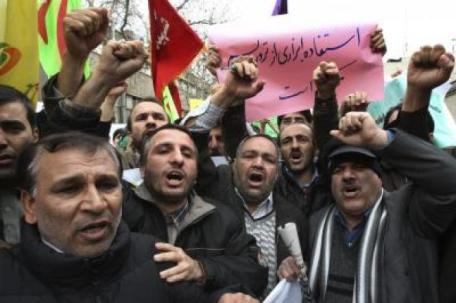The Wandering Terrorist: Where is MEK’s next destination

(Photo: Iranians condemn the West's support for MEK in a demonstration in Tehran)
The process of expelling the terrorist group Mojahedin-e Khalgh (MEK/MKO) from Iraq has gained momentum after President Obama withdraw American troops out of the country in 2011. The fate of MEK members has been a subject of discussion between the UN Secretary General Ban Ki-Moon and Iraq’s Prime Minister Nuri Maliki. Bound to be relocated from Camp Ashraf in the east of Iraq, the group are now eying to move to a new residence beside the former US troops’ Camp Liberty near Baghdad. Recently, MEK leaders have demanded relocation to Iraq’s western region adjacent to borders with Jordan. Iranian Diplomacy has discussed MEK’s situation in an interview with Amir Mousavi, foreign affairs’ analyst:
IRD: Why are witnessing so much procrastination in relocation, and expulsion, of the MEK members from Iraq?
AM: MEK’s relocation from Camp Ashraf is the result of Nuri Maliki’s insistence, and support from a considerable portion of Iraqi MPs. An agreement between the Iraqi government and the US allowed for their residence in Iraq as long as the American troops stayed in the country. The plan was to relocate them by the end of 2011, but there are problems with their destination, and their residence in Iraq was extended for another six months upon request by UN Secretary General Ban Ki-Moon. The Iraqi government agreed with the demand, but set its own condition: Camp Ashraf had to be evacuated and handed to the government and its MEK members should leave for another residence. The Camp Liberty which was formerly used by the US troops was allocated for the organization and so far, 400 members of the group have been transferred to the camp. All members of the group will be moved out to other countries at the next stage.
But there are problems here: France had welcomed their arrival at first, but later changed its decision. The Republic of Azerbaijan was another volunteer, but withdrew from its offer later. Jordan is the same. All in all, countries with unfriendly relations with Iran have tried to use the terrorist organization of MEK as a card to play against Iran. Even Saudi Arabia had signaled interest in hosting the group, but they also changed their mind. Receiving MEK members puts relations with Iran at stake and that is what these countries are afraid of. Besides, MEK is still on the US’ list of terrorist organizations.
IRD: So why has Jordan resigned to host them?
AM: Jordan aligns its policies with those of the US and Israel, and MEK members can be sure they won’t be used as a bargaining chip. MEK also holds an office in Amman. They will probably use the refugee camps constructed by Saddam Hussein to host the Palestinians. I should also add that the Palestinian groups hosted by Iraq, cooperated with the MEK members and Saddam Hussein in oppressing the uprising of Kurds and Shi’as after the first Persian Gulf in 1991.
IRD: Is there a possibility that MEK members move inside Jordan?

